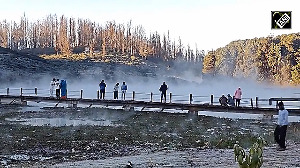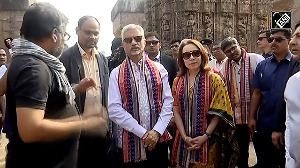At least three persons were killed and scores injured as violence escalated in Pakistan on Friday during government-sanctioned protests against an anti-Islam film made by an American film-maker, as tens of thousands of angry demonstrators took to the streets in various cities, torching cinema halls and banks and chanting slogans against the United States.
The Pakistan government summoned US Charge D'Affaires Richard Hoagland and lodged a "strong protest" against the film. It demanded that the US take immediate steps to remove the "blasphemous" video from YouTube.
Notwithstanding Premier Raja Pervez Ashraf's call for people to express their outrage peacefully on the day being observed as 'Youm-e-Ishq-e-Rasool' or 'Love the Prophet Day', scuffles broke out between police and protesters at several places.
In Islamabad, hundreds of protesters tried to break through police barriers and roadblocks so that they could march to the diplomatic enclave, home to the embassy of US, the Indian High Commission and missions of most Western countries.
Police used rubber bullets and teargas to push back the demonstrators, who shouted slogans against the US and the makers of the anti-Islam film.
The army was deployed inside the diplomatic enclave following a violent protest on Thursday that injured nearly 100 people.
Two persons, including an employee of a TV news channel, were killed during violent protests in Peshawar.
Protesters vandalised and torched two cinema halls and the chamber of commerce in Peshawar. Mobs also damaged shops in several areas. Footage on television showed several armed protesters firing during demonstrations.
A policeman was killed and several more were injured in clashes with armed protesters at the Native Jetty Bridge in Karachi. Protesters caused widespread damage to property in the port city.
Thick black smoke rose into the sky as two cinema halls and two banks were torched by mobs. Several demonstrations were also organised by students' groups and religious parties in the garrison city of Rawalpindi and nearby Islamabad.
A toll plaza and several vehicles were burnt by protesters on the outskirts of Rawalpindi on Friday morning.
Protesters also vandalised a CNG station, blocked roads by burning tyres and lobbed stones at passing cars.
In Lahore, protesters blocked the Circular Road by burning tyres.
The Jamaat-ud-Dawah spearheaded a large rally on the Mall Road after Friday prayers. JuD workers removed barricades while trying to march towards the US Consulate. A charged JuD activist climbed an electric pole and jumped off while shouting "Allah-o-Akbar".
He was taken to the Mayo Hospital, where officials described his condition as critical.
The number of protesters in all cities swelled after the weekly Friday prayers concluded at 2 pm local time.
Earlier, life across Pakistan came to a standstill in the morning due to a holiday declared by the government to protest the anti-Islam film.
Addressing a 'Love the Prophet' conference at the heavily-fortified Prime Minister's Secretariat, Ashraf called on the people to protest peacefully without causing harm to life or property.
At the same time, he warned that Muslims would not tolerate any attempt to defame the Prophet Mohammed.
"The holy Prophet Mohammed gave the message of peace and harmony. It is in this same spirit that I would like to make an appeal to the nation to maintain peace and avoid violence. It is our collective responsibility to protest peacefully without causing harm or damage to life or property," he said.
"An attack on the holy Prophet is an attack on the core belief of 1.5 billion Muslims. Therefore, this is something that is unacceptable," Ashraf said.
"The anger, anguish and hurt is even more deep after the discovery that this (the anti-Islam film) was a deliberate, premeditated act of mischief mongers based on bias, hatred and prejudice."
The anti-Islam film, Ashraf contended, was "not about freedom of expression."
He said, "This is more about hatred and it also demonstrates blatant double standards. If denying the Holocaust is a crime, then is it not fair and legitimate for Muslims to demand that denigrating and demeaning Islam's holiest personality is no less a crime?"
President Asif Ali Zardari will convey the emotions and views of Pakistanis when he addresses the United Nations General Assembly in New York next week, Ashraf said.
The film amounted to "hate speech equal to the worst kind of anti-Semitism" and the UN and other international organisations should frame a "law that bans such hate speech aimed at fomenting hatred," he said.
The Love the Prophet conference was initially to be held at a convention centre near the diplomatic enclave, where some 5,000 people gathered for a violent protest on Thursday.
Authorities decided after midnight last night to shift the conference to the Prime Minister's Secretariat for security reasons.
Authorities put in place strict security arrangements across the country after yesterday's protest by students and members of hardline groups outside the diplomatic enclave in Islamabad turned violent.
Cellular phone services were suspended in 15 cities, including Islamabad, Lahore, Rawalpindi, Peshawar, Quetta and Karachi, at around midnight for security reasons.
Residents of these cities complained the move had caused them considerable problems.
Sources said the mobile services were suspended till 6 pm on Friday evening on the orders of the Pakistan Telecommunication Authority to ensure that mobile phones were not used for any terrorist activities.
The authorities had resorted to a similar measure during the recent Eid-ul-Fitr festival.
Educational institutions, banks, government and private offices and markets across the country remained closed.
There was no public or private transport on the roads and CNG stations and petrol pumps too were shut.
Roads leading to Islamabad's diplomatic enclave and US consulates in Lahore, Karachi and Peshawar were blocked with shipping containers.
Additional security forces were deployed in most cities and authorities were on high alert.
In Lahore, an additional 15,000 police were patrolling the streets and authorities advised foreigners to stay at home.
In Peshawar, security was tightened for offices of foreign organisations and NGOs.
On Thursday, close to 100 protesters and policemen were injured, some of them seriously, during the protest outside Islamabad's diplomatic enclave.
The protesters clashed repeatedly with riot police, who were unable to disperse the mob despite using batons, teargas and rubber bullets.
Members of the students' wing of the Jamaat-e-Islami and extremist groups like Jamaat-ud-Dawah and Sipah-e-Sahaba joined the protest.
Interior Minister Rehman Malik blamed the violence during the protest on members of "banned groups."
He said the Punjab government, responsible for security in Rawalpindi, had done nothing to prevent the protesters from marching into Islamabad.








 © 2025 Rediff.com -
© 2025 Rediff.com -